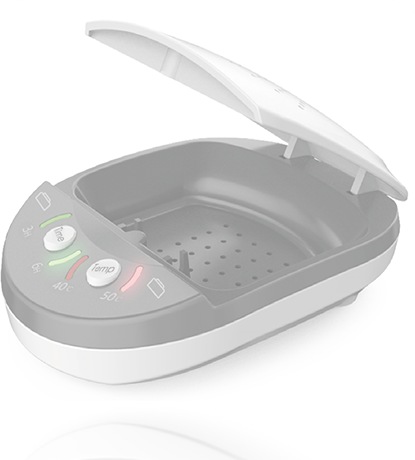No, you cannot purchase hearing aids directly from Unitron.Unitron creates world-class hearing solutions for people with hearing loss. We offer our products through reputable, qualified hearing healthcare professionals and distributors, who are specially trained to test hearing and to fit you with the right hearing aids, as well as provide expert advice, which are critical to the successful use of hearing aid. We recommend that you do not purchase hearing aids through Internet retailers, or online catalogs and mail orders, but instead seek the advice and services of an authorized Unitron hearing healthcare professional. We would also like you to be aware that there are Internet retailers who sell Unitron hearing aids who are not trained or authorized by Unitron to do so.
Hearing healthcare professionals usually recommend wearing two hearing aids for people who have hearing loss in both ears. This is called a binaural fitting. Two hearing aids help to improve hearing in noise, localize sound, and improve clarity and sound quality. Studies have shown that people are more satisfied with their hearing aids when they wear one in each ear.
Listening with hearing aids may seem unusual at first, especially if your hearing loss has developed over several years.
It takes a bit of time and patience to get used to how things sound, and how the hearing aids feel. Try to wear them as much as possible to get the most benefit, gradually increasing the length of time you wear them each day over the course of the first week or two.
Digital hearing aids that offer directional microphones combined with noise reduction offer sophisticated ways of processing sound to reduce as much background noise as possible. However, noise cannot be completely eliminated by any hearing aids, and keeping some level of background noise also results in a more natural listening experience and safety needs.
No. If you wear hearing aids, your ears will not become dependent on them. When you remove the hearing aids, your hearing loss will be the same as before you inserted them. There is more downside to not wearing hearing aids if you need them than wearing them.
Battery life depends on the length of time you wear your hearing aids, the size of your hearing aids, the type of circuit you have, and the size of battery you use. Ask your hearing healthcare professional about the estimated life of your particular batteries and refer to your hearing aid guide for additional information.
The life of your hearing aids depends on the style, how often you wear them, the amount of earwax produced, and how you care for them. On average, most hearing aids last four to five years before they require replacing.
There are things you can do, and things others can do, to help you communicate more easily – with or without hearing aids.
Effective communicate strategies
Tell others that you have a hearing loss and let them know how they can help (e.g. make sure you have my attention before speaking to me, speak slower, look directly at me).
Keep background noise to a minimum – turn down the radio and television when you’re talking, and avoid fans or other noisy devices during conversations.
Move closer to the person speaking and position yourself so you can always see them.
In large groups, position yourself in the center. At large gatherings, such as church services or lectures, sit at the front of the room. Use an assistive listening device such as inductive loop system, if available
How family and friends can help
Reduce background noise by turning down the television or radio, turning off the dishwasher, fan and other noisy devices..
Try to have only one person speaking at a time in large groups, when possible.
Get the listener’s attention before you begin speaking.
Do not cover your mouth or chew gum or food when speaking.
Reduce the distance between you and the listener. Look directly at the person when speaking.
Ensure conversation areas are well lit so the listener can watch facial expressions and lips.
Avoid conversations in the car where it is difficult to hear between the front and back seats or to read lips.
Speak at a normal conversational level, avoiding loud, exaggerated speech.

Taking care of your hearing aids
Taking good care of your hearing aids can help extend their life and ensure they continue to perform well. Here are some useful tips.
Cleaning
Clean your hearing aids every day. Use a soft cloth, tissue or special hearing aid brush to wipe the outside. Never use alcohol or cleansers. They harm the internal components and circuitry.
Use a wax loop or brush to remove ear wax and other debris. Never use a straight pin or other sharp object to clean wax from your hearing aids.
Care and cleaning of BTE and RIC product
Care and cleaning of ITE product
Storing
Use a dehumidifier kit regularly to prevent moisture from entering the hearing aids and damaging the components.
Do not get hearing aids wet. Remove hearing aids when swimming, showering, perspiring, etc.
Open the battery doors when they’re not in use.
Store hearing aids in a cool, dry place. Protect your hearing aids from excessive heat (e.g. hair dryer, cooking stove etc.).
Avoid dropping or banging your hearing aids on hard surfaces.

Care
Replace behind-the-ear earmoulds or ITE shell when they become dry, cracked, stiff or discolored.
Take your hearing aids to your hearing fitting centre for regular servicing and performance checks.
How to change wax guard on RIC product
How to change wax guard on ITE product
Batteries
Store batteries in a dry, safe location away from children and pets.
Replace dead batteries immediately and always discard batteries carefully.



